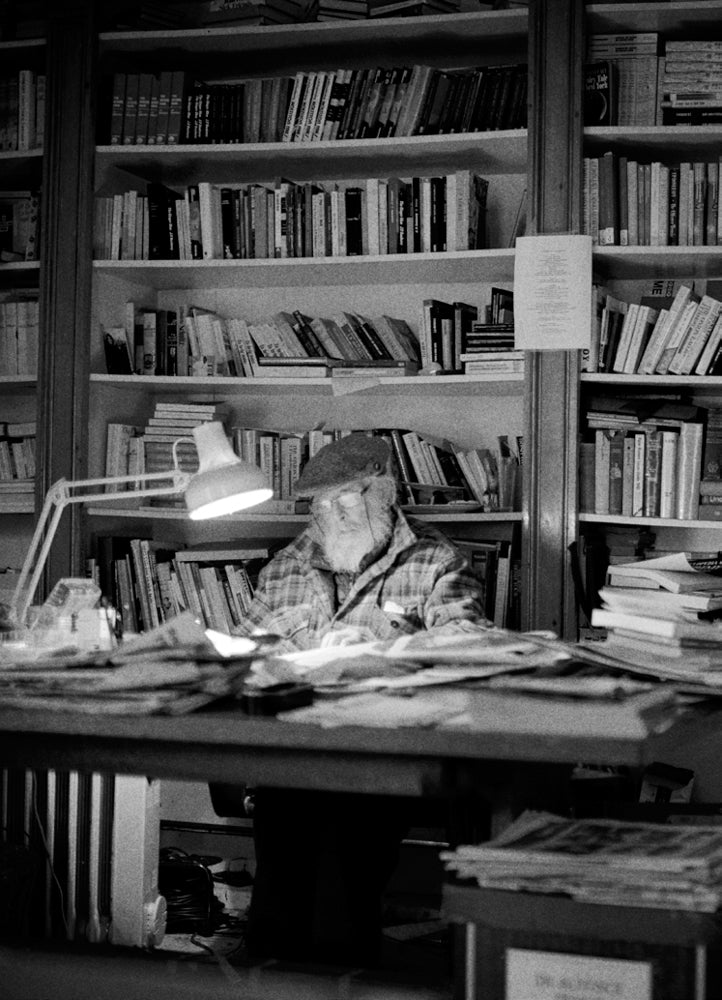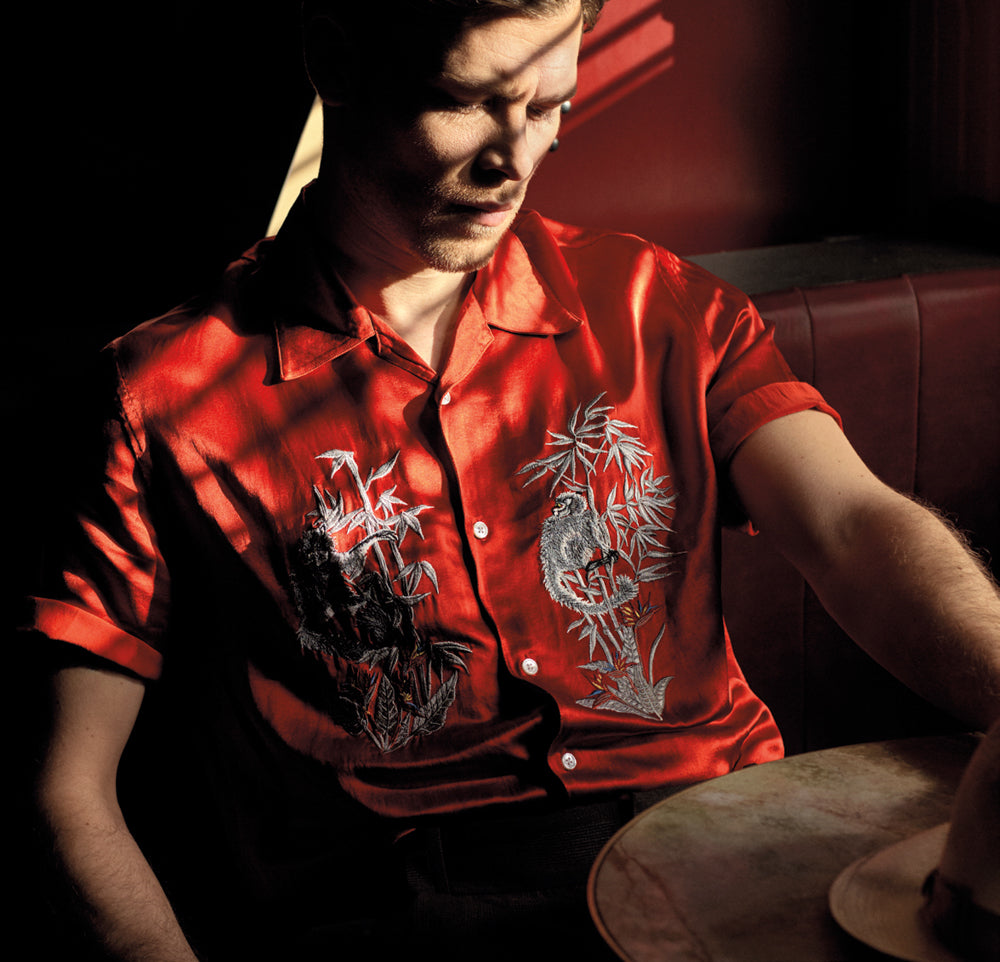Article: J.P. Donleavy

J.P. Donleavy
J.P. DONLEAVY

THE GINGERMAN AUTHOR GETS HIS CLOSE-UP
Writer J.P. Donleavy’s twenty-two-room manor house in the Irish Midlands is like something out of gothic fiction. The two-hundred-acre estate known as Levington Park features rolling green hills and an impressive herd of cattle that pals around with the property’s formidable mascot, a regal bull named Bullinger. When I arrive, it’s late and the house is quiet and cold, so I head to my guest bedroom and climb underneath an electric blanket graciously provided by my host to offset the costs of heating his gigantic manse.
Just down the hall, in a room where an eighteen-year-old James Joyce once spent the night, Johnny Depp is getting some shut-eye in preparation for the week’s work. Depp is here in Ireland shadowing Donleavy in order to prepare for his role in an upcoming screen adaptation of the author’s greatest work, The Ginger Man.
James Patrick Donleavy was born in Brooklyn in 1926 and raised in the Bronx by Irish immigrant parents. At twelve years old, while delivering newspapers, he began writing what he calls “editorials,” which in truth were angry missives directed at his many non-paying customers. Later, as a student at Fordham Prep, Donleavy joined the New York Athletic Club and began training with legendary boxing coach Arthur Donovan. Over time, Donleavy graduated to sparring with Harry Manning — who was one of Amelia Earhart’s navigators — and professional boxer Jake LaMotta. “Norman Mailer challenged me to a match after he heard about me throwing seven punches in a second,” Donleavy says.

“I set out to write a book only to gain recognition,” Donleavy says.
After Fordham Prep, Donleavy enrolled at Trinity College in Dublin, where he attended an exhibition of the artist Jack Butler Yeats. Encouraged by his friends John Ryan and Phyllis Hayward — both members of the White Stag art collective — Donleavy began painting.
His first two gallery shows in Dublin were met with mostly unfavorable reviews. Undeterred, Donleavy propositioned a prominent London gallery, but was told that although they very much liked his paintings, the gallery couldn’t show his work because nobody knew who he was. “I set out to write a book only to gain recognition,” he says in his gentle Mid-Atlantic accent. So Donleavy left Trinity a year before graduating, and started writing short fiction pieces. Six years later, the world was introduced to The Ginger Man and its philandering protagonist, Sebastian Dangerfield.
Released in 1955, The Ginger Man was published by Olympia Press, which put out a mixture of erotic fiction and more literary work by the likes of Henry Miller and Samuel Beckett. Obscene and scandalous, the book chronicles the hapless, booze-soaked sexual misadventures of an American student at Trinity College. It was inspired by Donleavy’s own experiences at the school, and the boorish Sebastian Dangerfield is a fictionalized version of his friend Gainor Stephen Crist. Donleavy describes Crist as “intelligent, pleasant, and elegant.” Nevertheless, the novel’s vulgar themes and the unrelenting immorality of its protagonist got it banned in Ireland and the United States.

A storm of litigation engulfed the novel for many years, but Ginger Mania ended, somewhat absurdly, with Donleavy owning Olympia Press. Because of the book’s cult status and irrefutable literary merits, it has never been out of print (more than 45 million copies sold), and the Modern Library ranks it among the best novels of the twentieth century. Donleavy went on to write nearly thirty novels, plays, and works of nonfiction.
These days, the author has given up his tweeds and foxhunting boots and lives a relatively solitary life. “You’d have to walk seventeen miles before you see anyone,” he tells me, as we stroll down the long driveway for our evening walk. At eighty-nine years old, he still moves intently, and with the same defiant posture that helped turn him into a celebrity.
When we arrive back at Levington Park, Bullinger is right out in front to greet us. Inside, on my way to dinner, I notice the dozens of paintings, watercolors, and etchings that line the walls of the long hallway leading toward the kitchen. The author has never stopped painting, and everything on the walls is his.

It’s been sixty years since The Ginger Man was published, and Donleavy has garnered his fair share of “recognition” in literary circles. His art, meanwhile, ranges from representational to abstract to beastly portraits, and the man appears to have a special affinity for images of giant fish eating smaller ones. All told, the works have a vitality that comes from powerful intuition and true modernist thinking — the undeniable talent of this completely self-taught artist. One of Donleavy’s paintings is now hanging in the Irish Museum of Modern Art in Dublin, in the very country that banned his writing decades earlier. It’s an oil painting of a nude woman titled Don’t Mind Me I’m From the New World.
On my second day at Levington Park, I accompany Johnny Depp, actor Cillian Murphy (who has also signed on to The Ginger Man film), Donleavy, and his son, Philip, on a trip to Weirs Pub, just one town over. From the moment we arrive, it is total bedlam. Locals who have already paid their tabs spot us, turn right around, and scurry back to their seats, settling in for a rare celebrity brunch sighting. Throughout the meal, conversations happen over the din of cell-phone camera shutters and frenzied keypad tapping. By the time we exit the pub, the entire county seems to be standing in the street in front of us. “We won’t be doing that again,” Philip says.


